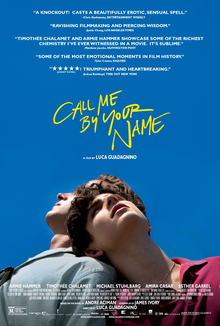
This film made some waves at the Oscars last year, notably clinching a nomination for Best Picture despite being not an American film at all. It was directed by Italian director Luca Guadagnino, there is dialogue in English, French, Italian and a sprinkle of German and it is set and filmed entirely in northern Italy. It’s also one of the most unashamedly positive, beautiful films I’ve ever seen with not the slightest touch of darkness in it and somehow it all work out perfectly.
17-year old Elio is enjoying his summer vacation at his parents’ holiday home in northern Italy. Every year his father, a professor of archaeology, invites one of his graduate students to stay with them and help with his research. This time the guest is the American Oliver, a larger than life figure with chiselled good looks and an outgoing personality, immediately attracting the attention of all the local girls. Elio on the other hand is more reserved, loves reading and is talented at the piano. At first he seems resentful of Oliver’s presence and is dismissive his American manners. However even as he experiments sexually with his girlfriend Marzia, Elio finds himself attracted to Oliver. When he brings up the subject with Oliver however, the elder man gently rebuffs him while not denying that he too feels something.
As usual, I try to keep myself from knowing too much about a film before I watch it but from the way that the camera lingers lovingly on Oliver’s physical form, I could tell early on that it was going to be about a homosexual relationship. Visually the film even compares Oliver’s looks with the Greek sculptures unearthed by Elio’s father. More unusual is that the film does so without the slightest hint of shame or negativity. Their sweet summer romance is depicted as being wholesome, wonderful and even if it is destined not to last, remains a memory to be treasured for a lifetime. There’s no real twist in this film and to be honest not really much of a plot as well, as everyone involved is supportive of the relationship. No one ever so much as intimates that there is anything wrong with homosexuality nor than Oliver and Elio shouldn’t have a sexual relationship. The result is as pure a romantic film as you could imagine with all of the beauty and passion and none of the downsides.
I confess that I don’t quite get the meaning and resonance of having the lovers call each other by their own name, which I understand comes straight out of the original novel by André Aciman. Plus from what I understand of the novel, its underlying theme is very different from what is filmed here as it is closer to the usual story of gay lovers having to lead parallel lives to hide their homosexuality. Here, there is no need for discussion of the topic at all and indeed there is a sense that the distinction is artificial and meaningless, as if everyone were bisexual and free to hook up with whoever is most well matched to them, male or female. Elio’s parents are exceptionally liberal in encouraging him to experiment, learn and enjoy his youth. All this is reinforced by how the entire family is portrayed as being highly educated and conversant in the arts. It may not be very realistic but it’s a fresh take and feels very liberating.
As a straight person, I confess that I still don’t find homosexual scenes to have an erotically charged effect on me but I do still find this to be an excellent romantic film, all the better for how unapologetically positive and joyful it is. I do not believe that it would still be possible to make a film like this with a heterosexual couple as there is just too much baggage. You can’t avoid bringing in concerns like how meaningful the relationship can be if it is only ever meant to last for a single summer or the appropriateness of a relationship between an adult graduate student and a teenager. Here, the novelty of this being a homosexual relationship helps sidestep some of these issues and of course Guadagnino is careful to avoid making it look as if Oliver is taking advantage of Elio, so there is nothing to get in the way of a guilt-free fairy-tale romance.
2 thoughts on “Call Me by Your Name (2017)”